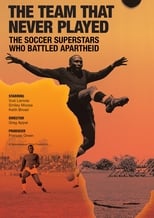If you are looking for a great idea for a soccer movie, you should buy the rights to this 10 year old documentary The Team That Never Played. Gather up the players interviewed by Writer-Director Greg Appel and fill out their stories while they can still be recalled. This is history that deserves to be retold on a bigger stage and preserved by more than word of mouth.
Smiley Moosa (Sundowns), Vusi Lamola (Kaizer Chiefs), and Keith Broad (Orlando Pirates) are 3 South African soccer players whose international careers were completely stifled by Apartheid. Much as in American baseball before 1951, athletes could only play in leagues defined by their race: black, white, colored (mixed race), or Asian Indian. FIFA in 1964 and the International Olympic Committee in 1970 banned South Africa from participating on the world stage.
The players
By the time Apartheid ended in 1994, it was too late for the players in this film to become stars, and when the film was made, they were in their late 50s. So the film focuses on how talented South African players were, and what could have been, had South Africans been able to perform on the world stage. Even in their late 50s, the men remain footballers who could still tear up a recreational game.
The 3 stars of the film are so engaging. As a 19 year old around 1970, Smiley Moosa tried passing for white on a white team. Later, he tried playing for West Ham but didn’t have a work visa. Vusi Lamola, a midfielder whose nicknames were “Computer” and “General”, played a season in the NASL with the Edmonton Drillers. Keith Broad is an interesting addition to the story because he is the first white man to play in the Black league and contributed thrilling headers. His nickname was Witch Doctor, and he reminds me of Steven Lenhart.
How soccer explains the wold
Unlike in the 2009 Matt Damon film Invictus, Appel’s documentary shows football is the game of the townships, a tribal game with crazed fans and willing women. While not mentioned much in the film, soccer was used as an organizing and funding vehicle for the African National Congress, according to Nichoas Griffin’s 2010 article “How Soccer Defeated Apartheid”. Griffin points out how football games were opportunities for the disadvantaged to cheer and for dissidents to meet, which we have seen in many parts of the world.
Why this story needs to be retold
Ten years after South Africa’s 2010 World Cup, it would be great to see a big screen film of these men and the many others who played through Apartheid and/or fought against Apartheid. Somehow they were overlooked during WC 2010, and that’s why I was so surprised to learn this story so long after the tournament. But in today’s polarized world, this story could be a reminder of the greatness that could be realized if we didn’t just look at our differences.
9 Soccer Movie Mom Rating = 9
Resources:
- Released: 2010-07-04 (Australia)
- In English, 54 minutes long for Australian TV
- IMDB
- Director: Greg Appel
- Stars: Essop “Smiley” Moosa , Keith Broad , Vusi Lamola
- Watch a 6 minute preview
- Spontaneous Films Website

